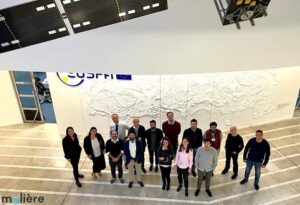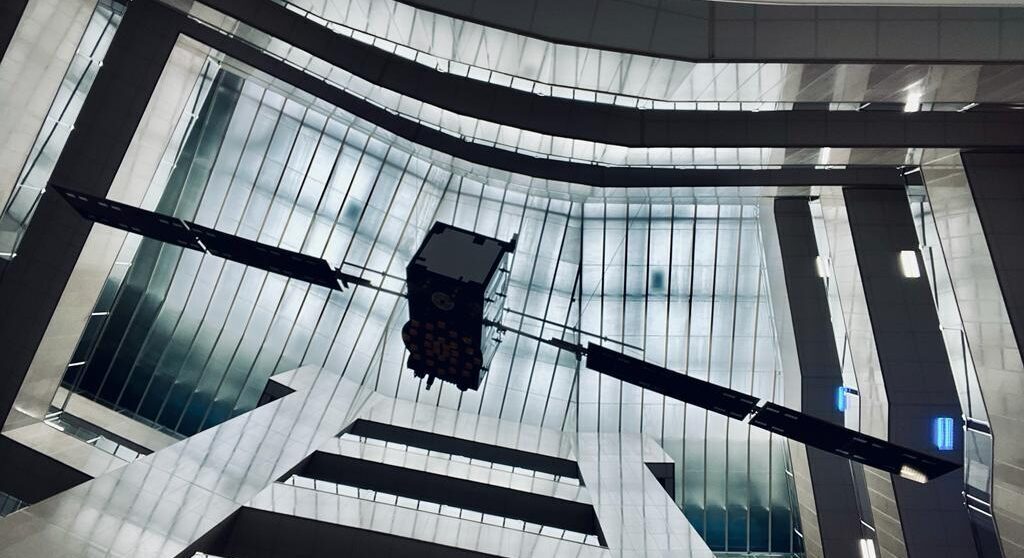The second Molière’s full consortium meeting took place last week in Prague, where the European Union Agency for the Space Programme (EUSPA) headquarters hosted all partners to prepare the end of 2022 and ramp up to 2023, which will mark the third anniversary of the team.
This face-to-face meeting gave the consortium the opportunity to formally welcome new partners, reinforced the importance of physical gathering to build up real synergies, and created the perfect environment to keep refining a scope of work where the final ambition is always the focus: to build a Mobility Data Marketplace (MDM) underpinned by blockchain technology, this way raising the profile, visibility, availability, and utility of geolocation data from GALILEO, the very own European GNSS.
It was within this proactive framework that the background work undertaken by Molière’s technological partners (Iomob, Nemi, Keita and Octo Telematics) was able to be combined in real time with the efforts and expertise of the rest of teams comprised of the Project Lead and mobility innovation consultants (Factual), shared micromobility operators (Dott), public transport operators (ATM), mobility think tanks (CARNET), researchers (UPC) and legal advisors (Osborne Clarke).

The first day provided a great opportunity to review Molière’s progress to date focusing on the MDM platform currently being finalised by Iomob, the development of the use cases to be piloted during 2023 (watch this space!), the business and regulatory aspects of Molière’s technology evolution, and the transformation of the marketing and dissemination strategies to align with the use cases that are about to become live.
It was on the second day that all partners were given the chance to discuss the forthcoming use cases and everyone’s involvement in detail. Parallel meetings took place to consider the technical aspects of these future pilot tests in more depth, including their technical development and deployment and the way of sharing them with interested stakeholders and the public, but also considering the very important legal and regulatory aspects which can still be challenging when dealing with blockchain and open data in the current European context.
The meeting concluded defining the next steps for the year to come, and overall resulted in a very conclusive session which has helped Molière define the path to continue its contribution towards the enhancement of GALILEO for open mobility data and future mobility services.
Molière is funded within the EU Horizon 2020 programme as a 36 months project, with an overall funding of 1,9M received funding from the European Union Agency for the Space EUSPA) under grant agreement No 101004275.
BACKGROUND
About Molière
Molière’s goal is to promote more sustainable, affordable, equitable, and accessible mobility, where micromobility and shared mobility services increasingly complement public transport. The Molière consortium works to demonstrate a diverse set of concrete, highly relevant mobility scenarios and use cases where geo-location data is key, addressing the needs of cities, public transport authorities, mobility service providers, and end-users.
About EUSPA
The mission of the EUSPA is to be the user-oriented operational Agency of the EU Space Programme, contributing to sustainable growth, security and safety of the European Union. Its goal is to communicate, promote, and develop the market for data, information and services offered by Galileo, EGNOS, Copernicus and GOVSATCOM. Galileo provides improved positioning and timing information with significant positive implications for many European services and users. Thanks to the multi-constellation of receivers that Galileo adds to, users can now know their exact position with greater precision. Galileo’s dual-frequency capability offers significant advantages in terms of achievable accuracy, but also in terms of improved resistance to jamming. The products that people use every day, from the GPS in their car to a mobile phone, benefit from the increased accuracy that Galileo provides. Galileo helps make Europe’s roads and railways safer and more efficient. Galileo boosts European innovation, contributing to the creation of many new products and services, creating jobs, and allowing Europe to own a greater share of the global market for added value services. For more information visit https://www.euspa.europa.eu/



